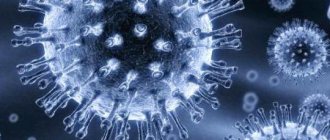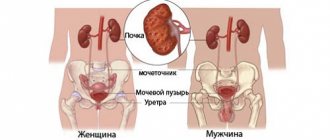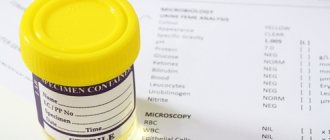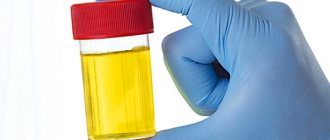It is not advisable to donate urine for laboratory testing to women during menstruation, but in some cases it is impossible to postpone the analysis. For example, this may be necessary in case of emergency hospitalization, during preoperative preparation for an unscheduled operation, or for conditions requiring immediate diagnosis. If a urine test is taken during menstruation, you should definitely notify your doctor about this.
During menstruation, urine specific gravity may be falsely high. It usually increases with diabetes mellitus and heart failure.
Despite the fact that at the beginning and at the end of menstruation the discharge is insignificant, it can distort the result of the analysis if it gets into the collected material, therefore, if possible, you should wait until the menstrual bleeding has completely completed.
To take a urine test, it is better to wait until your period ends.
Why do you need a urine test?
Urine is a processed fluid in our body. Along with it, unnecessary chemicals and toxins are removed. They enter the body with food, drink and medications, and arise as a result of the work of internal organs. Changes in the chemical and physical properties of urine may indicate the following diseases:
- Cystitis.
- Pyelonephritis, glomerulonephritis.
- Diabetes.
- Salts and kidney stones.
- Cardiac ischemia.
- Liver failure.
- Malignant and benign tumors of the urinary system.
- Inflammation due to ARVI, influenza, meningitis.
Laboratory diagnostics of urine is carried out not only for correct diagnosis, but also as a preventive measure.
This helps to identify the disease even before the appearance of alarming symptoms in a person. Read also: what laboratory tests can be done during menstruation.
The analysis is very informative, including showing kidney disease
Is it possible to take a test during menstruation?
During critical days, many indicators change in the female body, and this will certainly be reflected in urine readings. According to doctors, it is better to reschedule the study if time and the patient’s condition permit. The indicators will return to normal on the second day after the end of your period and the analysis will be reliable. This way, the attending physician and the patient will be confident in the correctness of the diagnosis and treatment.
If you need to be examined as soon as possible, you can still take the test, but provide the following conditions:
- When collecting urine, care must be taken to ensure that menstrual fluid does not get into the test material. We will look at ways in which this can be done below.
- Be sure to tell your doctor that you are menstruating. If there is a slight deviation in the indicators, he will be able to make an adjustment for the fact that a small amount of discharge may have entered the urine.
If the analysis indicators are in doubt, it is better to retake it again. Either take the necessary measures more carefully before collecting urine, or wait until the end of menstruation.
Urine analysis before critical days
Due to the fact that changes in the uterus and in the woman’s body itself begin a few days before the start of regulation, it is not recommended to take a urine test before menstruation. The sample may contain pieces of uterine tissue and a small amount of red blood cells. Even if you cannot see this with the naked eye, such indicators can distort the picture and cause an incorrect diagnosis.
In addition, there are circumstances when periods are irregular and it is not possible to clearly predict their onset and duration. Therefore, unless there is an emergency, it is better to take the test a few days after the end of your period.
How to properly donate urine during menstruation
There are rules for collecting urine during menstruation. They must be adhered to for the sake of reliability, and even more so, more attention should be paid if the patient is menstruating at this time.
It is not recommended to eat carrots and beets the day before
The day before, exclude foods that change the color of urine:
- carrot;
- beet;
- rhubarb;
- cherry;
- strong brewed tea, coffee.
Also, if you are taking medications based on analgin, phenolphthalein, methylene, or aspirin, you must notify your doctor. These drugs change the color of urine.
- If possible, avoid stress and excessive physical activity before collecting the analysis.
- Urine is collected on an empty stomach in the morning, immediately after waking up.
- Thoroughly wash the external genitalia.
- To prevent menstrual fluid from getting into the urine, a hygienic tampon should be inserted into the vagina. If you don’t have it on hand, you can use a sterile cotton wool swab.
- It is better to collect the analysis in a disposable container, which can be purchased at the pharmacy. This will ensure the sterility of the material.
- Flush the first portion of urine down the toilet, collect the middle portion in a container, and the last portion will not be needed for analysis either.
- The edges of the container should not touch the skin during urination.
- Urine needs to be delivered to the laboratory within 1.5 - 2 hours; in the summer it is better to use a refrigerator bag.
Urine must be collected in the morning, following the rules.
Urine for analysis can also be collected by catheterization. This method is carried out only by a doctor in a medical institution.
Catheterization is a measure for extreme cases, since the procedure is quite unpleasant and threatens trauma to the urinary tract.
Preparing to donate urine
Morning urine must be submitted for laboratory testing.
The biological fluid produced in the kidneys indicates their functioning and the condition of other organs. Before taking tests, you should avoid physical activity, drink alcohol, and not take medications and vitamins. It is advisable not to eat foods that affect the color of urine (beets, spinach).
The normal color of urine is light yellow. A different shade may indicate a disease. Dark color indicates pathology of the gallbladder, liver, reddish color indicates glomerulonephritis.
Regardless of the type of analysis:
- general,
- daily,
- according to Zimnitsky,
- according to Nechiporenko,
When collecting is done immediately or urine is collected over the course of a day, you need to adhere to the rule - collect an average portion of urine.
During menstruation, clear urine may become cloudy and its color may change. It is difficult to avoid the ingress of unnecessary inclusions and particles of menstrual blood during daily urine collection. These types of laboratory tests are not prescribed during menstruation.
Does menstruation distort the results?
Even if you follow all the rules for taking a test before or during your period, the result will be inaccurate in almost all cases. Critical days affect such indicators as:
- Transparency - if the epithelium from the vagina gets into the urine, it will become cloudy. If your doctor is not notified that you are menstruating, he or she may suspect problems with your pancreas or liver. Also, cloudy urine is an indicator of kidney stones.
- Specific gravity or density - during menstruation this indicator increases. In the absence of menstruation, an increase in density indicates dehydration or diabetes.
- Color change - blood entering the urine during examination will make it brown or scarlet. This is a sign of glomerulonephritis, cystitis, kidney stones or sand.
- The number of red blood cells will be significantly increased, which happens with inflammation.
- Increased sediment - normally the amount of epithelium reaches up to 10 in the field of view; during menstruation this figure will be several times higher. The doctor will suspect urolithiasis, cystitis, or even malignant tumors.
Is it possible to give urine for testing during menstruation? You will learn about this from this video:
Requirements for blood testing
It must be done regularly to monitor blood counts and the general condition of the body. There are several common tests:
- Biochemical. Gives an idea of the functioning of various organs, the level of metabolic processes by counting proteins, enzymes, bilirubin, cholesterol, etc.;
- General. Reveals the balance of red blood cells, leukocytes, platelets, ESR, hemoglobin level, which allows you to determine negative changes occurring in the body;
- For hormones. Necessary for diagnosing many diseases, including gynecological ones;
- For sugar. Determines glucose levels, allows you to identify endocrine disorders;
- Serological. Determines the presence of bacteria or viruses in the body;
- Immunological. Determines the level of disease resistance;
- Allergy tests. Identify intolerance to any substances;
- PCR. Lets you know about the presence of urological and gynecological infections. Sensitive to the presence of foreign DNA;
- For clotting. Allows you to determine the viscosity of blood, its deviations in one direction or the other;
- For tumor markers. Detects the presence of a tumor by seeing the proteins it produces.
It's no secret that blood is a direct participant in menstruation. It gets into the secretions from damaged vessels of the functional layer of the endometrium. Even if a woman is healthy and feels acceptable during her menstrual period, she inevitably loses some amount of blood. Taking tests during your period means exposing your body to new stress.
Some blood parameters change during menstruation. Painful sensations characteristic of critical days cause an increase in the erythrocyte sedimentation rate. This is a criterion characterizing the presence or absence of an inflammatory or infectious process. A woman who is menstruating will have a noticeably higher red blood cell count and a lower platelet and white blood cell count.
On critical days, the level of hemoglobin inevitably decreases, and the biochemical components of the blood change. Most women take painkillers, which can affect the analysis. All this makes such a study insufficiently informative.
PCR analysis during menstruation can give a false positive result for the reasons already described. The study for tumor markers will also have to be postponed until the end of the critical days. Both of them detect serious diseases, so a mistake can lead to unpredictable and dangerous consequences.
1. As for the study of hormones, it must be done precisely on menstrual days. Days 5-7 of the cycle are best. This is the most accurate way to find out the concentration:
- Prolactin;
- FSH;
- Luteinizing hormone;
- Testosterone;
- Cortisol;
- Estradiol.
It is important not to take medications during this period, as they can “smear” the results of the study. 2
Menstruation will also not interfere with a serological blood test. He will let you know about an infectious disease in any case
2. Menstruation will also not interfere with a serological blood test. He will let you know about an infectious disease in any case.
Some blood tests prescribed by a doctor require special preparation, including for a specific day of the menstrual cycle. In this case, when issuing a referral for analysis, the doctor explains in detail how to donate blood and what rules must be followed. Most often, these requirements relate to hormone studies.
- Prolactin is the main hormone responsible for reproductive function. Production is carried out by the anterior part of the pituitary gland.
- Estradiol is the most active sex hormone in women. Produced by the follicular apparatus of the ovaries.
- FSH (follicle stimulating hormone) is responsible for preparing the female body for pregnancy. Produced by the anterior lobe of the pituitary gland.
- LH (luteinizing hormone) is responsible for the functioning of the gonads. Produced by the pituitary gland.
- Cortisol is a stress hormone produced by the adrenal glands.
- Testosterone is the main male sex hormone. Present in small quantities in the body of women. Produced by the ovaries, adrenal glands, and during pregnancy – by the placenta.
A blood test for luteinizing and follicle-stimulating hormones is recommended to be taken between the 3rd and 5th day of the menstrual cycle. Testosterone levels are examined on days 8-10, and progesterone and estradiol on days 21-22. You can donate blood during menstruation, and the menstrual cycle does not matter for serological testing (syphilis, hepatitis, HIV, infectious antigens, etc.). Menstruation does not affect the activity of viruses. It is not prohibited to conduct research to establish blood type and Rh factor.
What may be the results of the analysis?
Even if the patient is healthy, the results of a urine test during menstruation may differ significantly, as described in the table.
| physical and chemical indicators | Norm | During menstruation |
| Specific gravity | 1.010 – 1.020 g/l | 1.030-1.050 g/l |
| Protein | Up to 0.33 g/l | 0.34 g/l and above |
| Glucose | Up to 0.8 mmol/l | 0.8 mmol/l and above |
| Red blood cells | Up to 3 in sight | From 10 and above |
| Leukocytes | Up to 6 in sight | Above 6 |
| Bacteria | None | Small quantity possible |
There is a situation when an ultrasound of the kidneys indicates pyelonephritis, but the urine test is normal. This happens during the chronic stage of the disease. For a more accurate diagnosis, urine tests according to Nechiporenko, bacterial culture, and urine protein analysis are recommended.
In order to avoid false diagnosis and incorrect treatment, it is better not to have your urine tested while you are menstruating. The test should be carried out only in critical situations and in compliance with all necessary measures.











